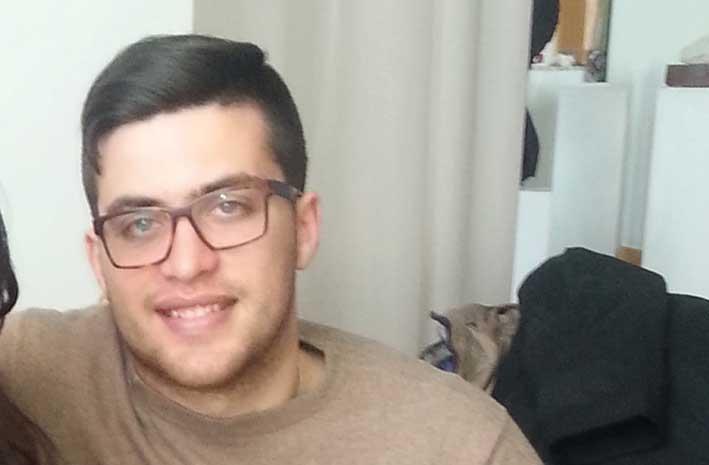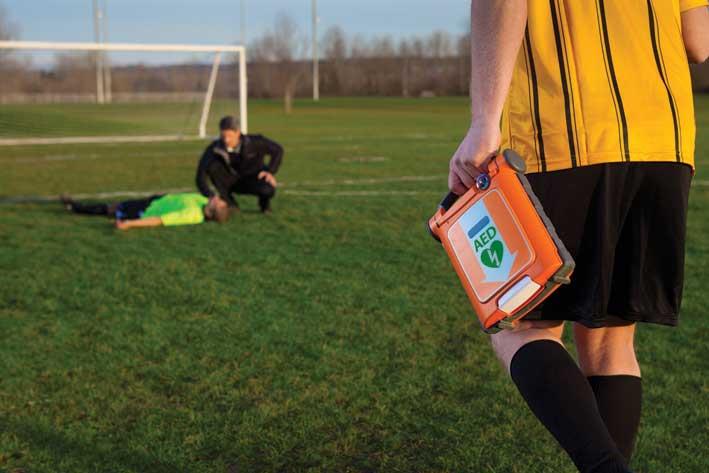A promising football talent, the Italian Felice Natalino, was signed up as an Inter player at 18 and played at Champions League level in 2010. He was already being hailed as Inter's next rising star, an international player with huge potential. However, his career was to be very short- lived.
In 2012, when Felice Natalino was still 20, a routine medical test showed something was wrong with his heart. Further investigation showed he had a difficult-to-diagnose heart condition which could lead to cardiac arrest. He was advised to stop playing, but it took an actual experience of cardiac arrest to drive the point home.

I met Felice during his whirlwind visit to Malta for the fund-raising 'Maratona bir-Roti' held last March. Outwardly, there's no sign of his heart condition and how it's affected his life. I find myself interviewing a fresh-faced young man, full of energy and vitality, who smiles constantly.
"I had my first cardiac arrest in 2013. It happened a few months after the investigation into my problem and the eventual diagnosis," he says. "I hadn't experienced any difficulty until then, but I had been warned of the risks and about the symptoms I would feel in case of cardiac arrest."
"In February 2013, I was out with a friend when my heart started beating wildly and would not slow down, despite my trying to calm it down. My friend, who was well meaning but unaware of the risks, suggested I go home to sleep and rest. But I knew that if I didn't go to hospital immediately, I would die.

"The arrest, a major one, happened in hospital. I spent the whole night undergoing resuscitation procedures that kept me alive. I was advised to have an Implantable Cardioverter Defibrillator (ICT) implanted in my chest. It's a device that can save my life since it kick-starts the heart automatically in case of cardiac arrest.
"Had I wanted to, I could have gone on to play internationally even with my heart problem, but after that cardiac arrest I reset my priorities. I did not want to risk my life so I officially retired from football later that same year."
Felice's career as a professional player may be over, but even now he still plays occasionally with friends and remains connected with the football world through his scuola calcio in Calabria. "At top level football we undergo thorough health checks," Felice says. "Although my condition was not diagnosed in my first test to enter the team,
I was fortunate that it was diagnosed eventually. Had it not been for football, I may not be alive today."
He is sharply aware of the importance of having easy access to automatic external defibrillators in busy areas where people of all ages gather. This is one of the main reasons he accepted to come to Malta for the fund raising marathon to support further installation of life-saving Automated External Defibrillators (AEDs) in schools and within sports organisations. The initiative was supported by the Malta Resuscitation Council.
"In Italy we are bound by law to have AEDs in stadiums and in schools," Felice explains. "I would be arrested if I did not abide by this law and have an AED readily available at my football school. In Italy we do not need to raise funds for such things any more, simply because our law has recognised the importance of this kind of measure. I hope my presence as a cardiac arrest survivor at this event in Malta will help drive the message home."
Emergency physician Dr Jonathan Joslin chairs the Malta Resuscitation Council. "We constantly emphasise how the presence of defibrillating apparatus in locations where people congregate can definitely save lives," he says. "Ten years ago we only had some four AEDs in Malta. Today we have over 400 AEDs located in different places around the islands. During the first 'Maratona bir-Roti' held last year, enough money was raised in two days to purchase 75 AEDs. This year's Marathon aimed at raising funds and increasing awareness of the importance of having AEDs in all remaining schools and gathering places."
The MRC emphasises the importance of more bystanders having basic life support skills and being knowledgeable of routine procedures to follow in case of emergencies. It also provides training for doctors, nurses and paramedics, as do also other important bodies such as the St John Ambulance Brigade, Malta Red Cross, ERRC, Socjeta Nazzjonali Ghas-Salvatagg, Kevin Gauci, Soteria Ltd. and others.
Dr Joslin continues, "We serve as an advisory body, but carry out a lot of work through the media and lobby heavily for an increased presence of AEDs. We would like to see more people taking up basic life support training on a regular basis. At the moment we have just issued a training video in Maltese and believe that every household should have a copy. I can never stress enough that CPR buys time but with an AED one can save a life before professionals arrive to continue resuscitating on the scene. Sufferers have an 80% chance of survival if the right equipment is used early on."
Per Ivan Jensen of Cardiac Science Corporation, manufacturers of Powerheart Automated External Defibrillators explains, "Technoline Ltd introduced Powerheart Automated External Defibrillators in Malta some 14 years ago. The technology is constantly improving and safety features make these AEDs ideal for use by people who have no medical training.
"The machines speak and display text to assist in their operation with instructions that can be seen or read, according to circumstances. You just cannot make mistakes with these machines. In my work I can compare how Malta is faring with other countries and can say that the 'Maratona bir-Roti' is a superb initiative which is helping to move things in the right direction."›‹